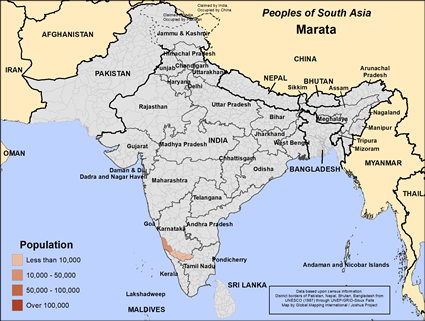Marata in India

Send Joshua Project a photo
of this people group. |

Map Source:
People Group data: Omid. Map geography: UNESCO / GMI. Map Design: Joshua Project
|
| People Name: | Marata |
| Country: | India |
| 10/40 Window: | Yes |
| Population: | 88,000 |
| World Population: | 88,000 |
| Primary Language: | Tulu |
| Primary Religion: | Hinduism |
| Christian Adherents: | 0.05 % |
| Evangelicals: | 0.00 % |
| Scripture: | New Testament |
| Ministry Resources: | Yes |
| Jesus Film: | Yes |
| Audio Recordings: | Yes |
| People Cluster: | South Asia Tribal - other |
| Affinity Bloc: | South Asian Peoples |
| Progress Level: |
|
Introduction / History
The Hindu Marata people in India have a background primarily connected to agriculture and traditional crafts. Their heart language is Tulu but most also speak regional languages such as Marathi and Kannada depending on their location.
What Are Their Lives Like?
The Marata people live in rural villages, focusing on farming and small-scale craftsmanship. They grow crops such as rice, wheat, and vegetables. Many also engage in weaving, pottery and other artisanal crafts.
Their diet includes both vegetarian and non-vegetarian food, featuring staples like rice, lentils, vegetables and meat. Traditional dishes such as dal (lentil soup), roti (flatbread) and vegetable curries are common in their meals. Weddings among the Marata are elaborate, involving rituals like the exchange of garlands, sacred fire ceremonies and celebrations with music and dance.
What Are Their Beliefs?
The Marata people practice Hinduism, worshiping various deities and observing numerous religious rituals and festivals such as Diwali, Holi and Navratri. Their belief system emphasizes values like dharma (duty), karma (actions and consequences), and ahimsa (non-violence). They conduct rituals and ceremonies to honor their ancestors and deities.
What Are Their Needs?
The Marata people need better access to quality education to provide more opportunities for their children. Improved healthcare services are essential due to limited availability of medical facilities and high rates of preventable diseases. Economic support through modern agricultural techniques, market access, and vocational training can enhance their livelihoods. Infrastructure development, including better roads, clean water supplies, and reliable electricity, will greatly benefit the Marata community. Addressing these needs will help the Marata people achieve greater socio-economic stability while preserving their traditional way of life.
Prayer Points
Ask God to open their eyes, hearts and ears to the good news of the savior.
Pray for the Lord to raise up the right people to disciple the Marata in his ways.
Pray for the Lord to demonstrate his power and goodness among them in a way they will understand.
Ask for an intervention of the Holy Spirit in each of their families.